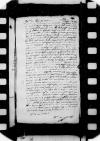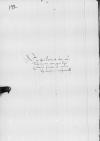List #2063
Ioannes DANTISCUS do Tiedemann GIESEWartenburg (Barczewo), 1539-01-28
Regest polski:
Dantyszek, zapoznawszy się z listami wojewody pomorskiego [Jerzego Konopackiego] do wojewody malborskiego [Jerzego Bażyńskiego] oraz do rady Gdańska, wywnioskował, że Konopacki zdradził „Kości” (Ossi) [Stanisławowi Kostce] treść rozmów prowadzonych w sprawie przechowania pieniędzy [z podatku], dzięki czemu ten uzyskał z dworu dokument umożliwiający odebranie zgromadzonej kwoty. Zdaniem Dantyszka Konopacki postąpił tak, spodziewając się w zamian przychylności dworu w swoim konflikcie z rodziną Kosów o młyn. W liście do Bażyńskiego Konopacki twierdzi, że nie znał sprawy, ponieważ pisarze miejscy nie ogłosili recesów [sejmu grudziądzkiego], w liście do rady Gdańska przyznaje natomiast, że o sprawie wiedział, nie znał jednak treści odpowiedzi króla [Zygmunta I], co nie jest prawdą. Dantyszek uważa, że jeśli miasta nie stawią oporu, państwu [tj. Prusom Królewskim] grozi ruina.
Dantyszek popiera pomysł napisania do króla. Sugeruje, aby w liście nie dążyć do zatrzymania pieniędzy do następnego sejmu [pruskiego], lecz prosić, by w czasie tegoż sejmu dokonane zostało całkowite rozliczenie.
Konopacki, twierdząc, że pieniądze z podatku powinny być przekazane królowi, ignoruje fakt, iż podatek ten uchwalono na potrzeby ziem pruskich i na ich obronę. Jest to rozumowanie charakterystyczne dla osób niebędących indygenami.
Dantyszek prosi Giesego o zachowanie poruszonych spraw w tajemnicy. Jego zdaniem pieczęć Konopackiego [pod listem do króla] nie jest niezbędna — wystarczy akceptacja Giesego, wojewody malborskiego, kasztelanów: elbląskiego {Ludwoka Mortęskiego] i gdańskiego {Achacego Cemy] oraz ewentualnie wojewody chełmińskiego [Jana Luzjańskiego]. On sam, jak pisał wcześniej, włączy się do sprawy w odpowiednim czasie.
Rękopiśmienne podstawy źródłowe:
Publikacje:
| ||||||||||
Tekst + aparat krytyczny + komentarzZwykły tekstTekst + komentarzTekst + aparat krytyczny
Reverendissimo in Christo Patri et Domino, domino
Reverendissime in Christo Pater et Domine, frater et amice carissime et honoran(de) or honoran(dissime)⌈honoran(de)honoran(de) or honoran(dissime)⌉.
Salutem et fraterni amoris commendationem.
Perlectis litteris domini
Utcumque res habet, scribendum tamen esset
Haec omnia in ea, quae inter nos crevit, fiducia apud Dominationem Vestram Reverendissimam maneant. Quodsi
Quam dominus Deus sospitet prosperetque in omnibus diutissime.
Ex
Reverendissimae Dominationis Vestrae deditissimus frater
[1] This letter, which is unknown to the editors, was attached to cf.
[2] Negotium molendini, “the mill case”, was being discussed during the spring meeting of the
[3]


 BCz, 245, p. 122
BCz, 245, p. 122